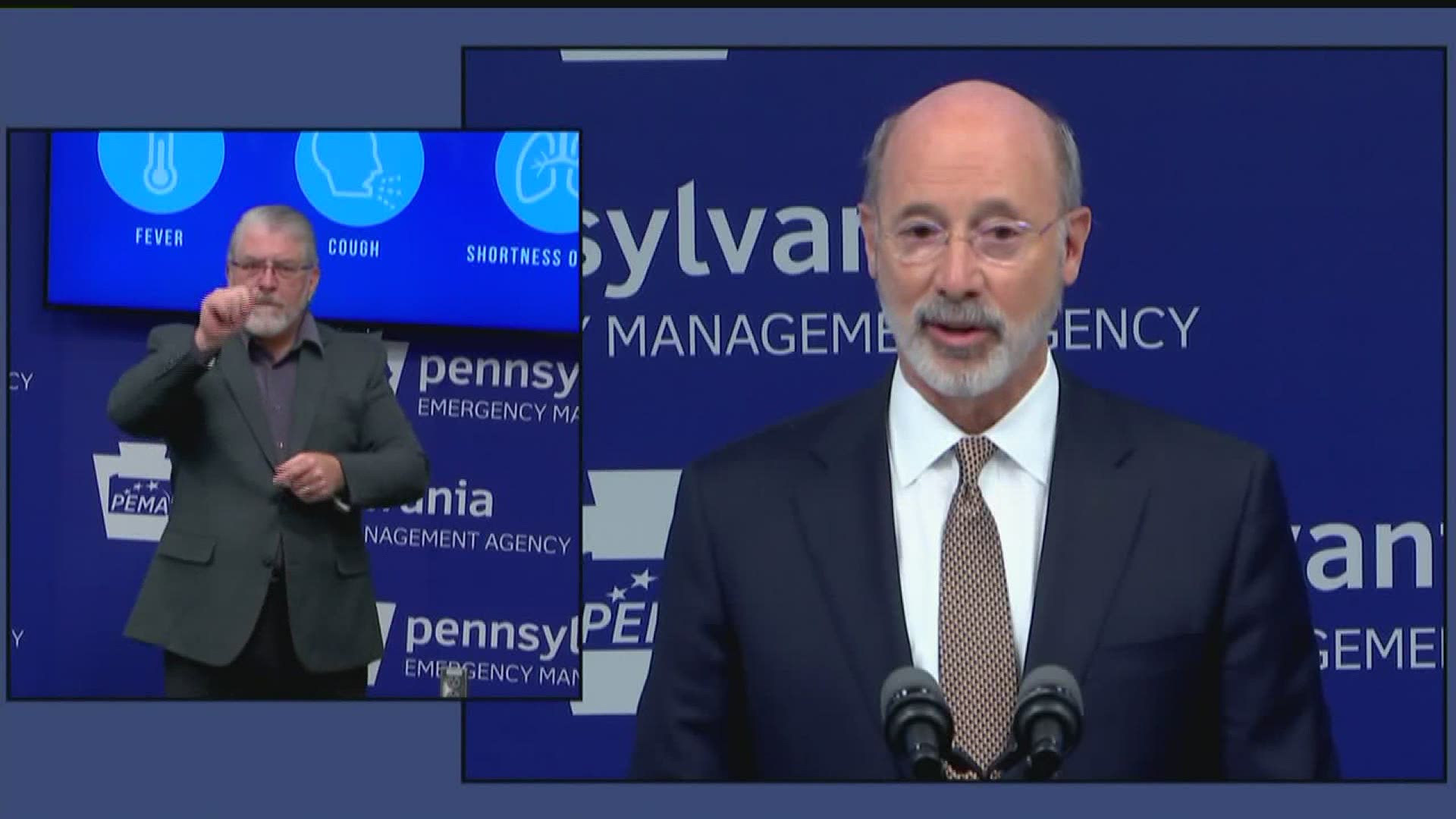PENNSYLVANIA, USA — Update, 4:15 p.m.: The PIAA said it will announce a decision on how to proceed on Friday.
Original Story
Governor Tom Wolf said at a press conference today that his recommendation is no high school sports be played until January 2021 amid the coronavirus pandemic.
Wolf offered his recommendation while speaking with Secretary of Health Dr. Rachel Levine and Walmart Regional Health and Wellness Director Jamie Reilly.
Wolf said, "The guidance is that we ought to avoid any congregate settings... and that means anything that brings people together that's going to help that virus get us."
"We ought to do everything we can to defeat that virus," Wolf said. "So, anytime we get together for any reason, that's a problem. It makes the virus easier to spread. So, the guidance from us is no sports until January 1."
That was the end of the press conference, and there were no follow up questions allowed to be asked.
In response, Pennsylvania House Republican Caucus Spokesperson Jason Gottesman, made the following statement:
“Gov. Wolf is completely off the rails. After repeatedly saying school reopening decisions should be left to local school districts, after the PIAA paved the way for sports to safely resume, after his own Secretary of Health said earlier this week that guidance for PIAA events would be forthcoming, the governor today issued another unilateral ‘recommendation’—made without any advance notice or consultation with the General Assembly—that is devastating for student athletes, parents, and communities.
“In making his announcement, the governor did not justify why a place like Sullivan County that has five confirmed cases, must be treated the same as Allegheny County or Philadelphia. In fact, he provided no data or justification at all.
“For reasons beyond understanding, the governor waited until practices have already started, equipment has already been purchased, fees have already been paid, and dreams of a return to normalcy have already been formed by athletes and families alike.
“What is to become of student-athletes seeking scholarships? Why can professional sports and recreational leagues play events, but not PIAA sports? Why did this decision have to even be made today without consulting anyone in the people’s branch of government? These are just a few of the questions left unanswered by this unjustified and inconsistent decision.”
Those sentiments were echoed by State Sen. Scott Martin (R-Lancaster), who also issued a statement:
“Sadly, Governor Wolf has once again made a pronouncement at the 11th hour and refused to share the underlying data with the public. This is, of course, after he entrusted the PIAA and local districts to develop responsible plans that protect the health of our young athletes – something each has been working tirelessly to do.
“The fact is that school sports play an extremely positive role in the mental health of our children, their health, their development and we should not give up on them so easily. For many of our students, sports is also an important structure in their lives that they need, given personal circumstances, and for some, keeps them safely off the streets at night. For so many, athletics serves as a critical bridge of opportunity to advance their learning at the collegiate level.
“Since Pennsylvania went to the Governor’s green phase, athletic events and youth leagues have been competing safely, even with safe protocols for spectators, without problems. If a responsible plan has been developed for a particular sport and there’s no supporting data showing why fall sports should be cancelled, these young athletes should be given the chance to compete and pursue their health and dreams. However, cancelling all sports unilaterally is unfair to these young student athletes and coaches, to the people who have worked hard to put these plans together, and to our communities.
“Lancaster County’s response to this pandemic – and the actions that have been taken to keep our citizens healthy – are working and are a model to the rest of Pennsylvania. Since youth sports have already been occurring safely in our community, and we have shown the ability to plan and take action in a responsible manner, the Governor should respect what we have done, and what we can do moving forward.”
Earlier this week, the Lancaster-Lebanon League voted to delay the start of the fall sports season.
The PIAA was also expected to release guidance on spectators this week as well.
Here is the official recommendation from the Wolf administration:
"The Pennsylvania Department of Health and Department of Education today jointly recommended that Pre-K–12 school and recreational youth sports be postponed until at least Jan. 1, 2021, to protect children and teens from COVID-19.
"The administration is providing this strong recommendation and not an order or mandate. As with deciding whether students should return to in-person classes, remote learning or a blend of the two this fall, school administrators and locally elected school boards should make decisions on sports.
"Highlights of the recommendation to pause youth sports until Jan. 1, 2021:
- Applies to team and individual, school and non-school recreational youth sports;
- Includes competitions, intramural play and scrimmages;
- Continue conditioning, drills and other training activities on an individual basis;
- Does not apply to collegiate and professional sports;
- Gathering limits remain unchanged - no more than 25 persons may gather indoors and 250 outdoors.
"The administration is updating existing sports guidance to reflect this recommendation.
"The administration recognizes the importance of getting children back to school, while also protecting the safety and well-being of students and educators. Guidance for schools is available. The guidance represents endorsed best public health practices related to social distancing, face coverings, hand hygiene, and cleaning and disinfecting in school settings. It also outlines how to accommodate individuals with disabilities or chronic conditions, procedures for monitoring symptoms, and responding to confirmed or probable cases of COVID-19 in the school community."

